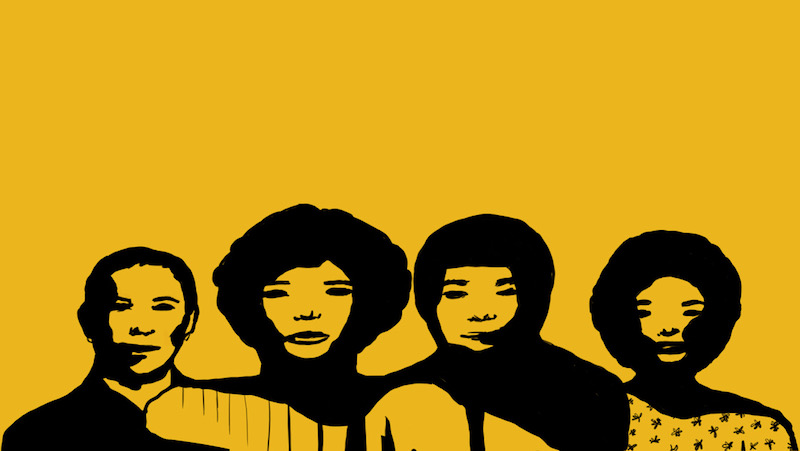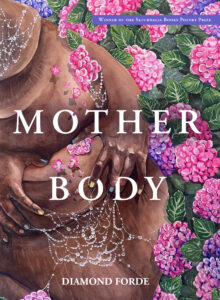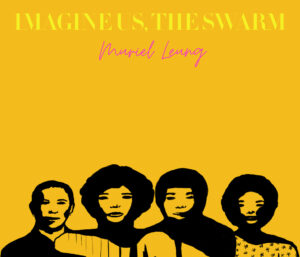
Judging by the temperatures out there, I think it’s safe to say that summer has well and truly begun. Time to roll up those towels, pack a cooler of beer and claim some small spot on a crowded beach near you. There, wedged among families of screaming children and selfie-posing teenagers, you may read in a version of peace. Why not curl up with a new volume of poetry? So many excellent collections have come out this year, and we’ve chosen five knockouts in which to lose yourself to the sound of crashing waves.

Mother Body by Diamond Forde
(Saturnalia Books, March 15)
Summer is the season sent to remind us of the body, heat forcing us to peel clothing layers and reveal flesh—that source of pleasure and pain that takes center stage in this astonishing debut, picked by powerhouse poet Patricia Smith for Saturnalia’s Poetry Prize. Forde bursts onto the literary scene an already-masterful lyricist, whose finely-wrought poems of sonic and visual lushness go down like the Häagen-Dazs Mother Body’s speaker “tongue[s]” into her “ever-eager mouth.” This is a book about hunger and desire, how to reclaim them in an act of resistance against the shame society foists upon women—particularly Black women—for expressing either. A “fat girl,” Forde’s speaker tracks her emergence from a lineage of corporeal shame, beginning with a step-mother who calls her “disgusting” and a grandfather who “once grazed his cold hand / across my rounding cheek and prayed for bones.” Racism causes more harm, as when, in childhood, a “Blonde Girl studies the field of fuzz blooming my bare arms … says you should shave that, then slings up her own skin for scrutiny.” Mother Body deftly shows how this kind of microaggression contributes to Black precarity writ large: “Momma taught me to breathe slow / in the blue bar of a cop’s light—they don’t understand fear / isn’t the same as guilt—but my breath is not a metaphor / so I can’t shape it to a mask, to camouflage, to a bullet-proof vest,” Forde writes movingly in “Breath Ode.” To value and nurture her breathing body is thus a counter-cultural act, which Mother Body dramatizes in lyrics that explore the psychological work of imagining oneself beyond received social frames. The reader roots for Forde’s speaker as she rises above feelings of abjection to achieve self-love, re-learning the body as a space of pleasure and refuge. The collection ends triumphantly on the “near-explosion” of an unexpected orgasm while at the gym, at the elliptical machine tuned into Cardi B: “I want / my pussy to know I have loved it since the first time / I pried its smile into a lazy camera’s eye, / spied its abundance of pink.”
frank:sonnets by Diane Seuss
(Graywolf Press, March 2)
Death on the Beach. That is the name of the cocktail I would invent to wash down the whopping 128 sonnets in Seuss’s gut-wrenching new book. Haunted by the ghost of Frank O’Hara—the loquacious New York School poet who died at 40 on Fire Island, NY—the book recounts an eventful life, one marked by its own losses, including the early demise of the speaker’s father and her friend Mikel, whose photo graces frank’s cover. In her opening poem, Seuss invokes the late bard of Times Square: “I’m a little like Frank O’Hara without the handsome / nose and penis,” she quips, narrating her trip to Cape Disappointment, where she contemplates “that long drop from the lighthouse / to the sea.” Many of frank’s sonnets express a similarly morbid fascination with the waves: “I could do it. I could walk into the sea,” she writes in one poem, citing the oceanic deaths of Jeff Buckley, Dennis Wilson, and the poet Hart Crane. “It would be fun!” Seuss jokes, echoing O’Hara’s trademark mix of pathos and humor here as she does throughout frank. As the sonnets progress, Seuss moves inland toward the Midwest of her childhood, filled with its own fatal liquids: Recalling her “dad’s abdominal tumor,” Seuss describes how her other “drove to Lake Michigan. I pictured her / making her way into the sheltering undertow.” In another sonnet, Seuss recalls an after-storm flood, “riding our bikes through that water which must have been full of shit.” The memory arises in a poem about a later experience, the speaker kicking two “crackheads” out of her son’s apartment: “they’d come to feast off of what was left / of him, his entrails I guess,” she writes. With each untitled sonnet lurching toward the next to form a kind of dreamy life narrative, the collection reads simultaneously as memoir and elegy: a long lament for all the literally and figuratively lost lovers, family members, friends, artists, and past selves. Dealing frankly with the horror of the always-already-dying body, these sonnets drip with grief but manage to laugh through their tears: “I fell in love with death,” Seuss writes, “his kisses wet and sweet.” Death is “Kinky… / he / sucked my fingers while I read him Peter Pan, itself a children’s book / about dead children”—which could be the tagline for frank itself. Light beach reading, this is not. But “the sun digs its own grave, the copper afterglow,” Seuss reminds us.
Welcome to Sonnetville, New Jersey by Craig Morgan Teicher
(BOA Editions, April 6)
“Air conditioners hum forever” in the Garden State, where Craig Morgan Teicher confronts middle age and existential dread in his fourth collection—the perfect beach read for the confused lot born between Generation X and the Millenials (or for those confused by us). A poignant meditation on aging, parenthood, marriage and art-making, Welcome to Sonnetville extends the themes of Teicher’s Lenore Marshall Prize-winning book The Trembling Answers (BOA 2017). That last collection traced a mind’s coming to terms with adulthood and family responsibilities, learning that “love is the things I do over / and over again.” This premise gets eerily reframed in Sonnetville as repetition compulsion or a form of haunting. “Encoded mustn’t the past recreate itself? / Who, if not me, is my father? Where else am I but home?” Teicher asks in “10 Rock Hill Lane.” In this shiver-inducing lyric, seeing a new house built “on the bones / of my old one” spurs the speaker’s revelation that what he thought was free will was actually adherence to a childhood “template”: “how to raise a new family free of the chaos / of one’s own youth,” Teicher wonders—that question that pays the summer-home mortgages of a squillion therapists. The death of the speaker’s mother is an early trauma to which the poems return and return like a tongue worrying a sore tooth: “She’s been dead / twenty-three years—why do I feel the need / to write that again?” As the reader learns that the speaker is approaching the age when his mother died, the collection’s preoccupation with mortality registers as urgent beyond the standard mid-life crisis. For all this heaviness, Sonnetville lightens the load with much (dark) humor and wit. In the poem “Longevity,” for example, Teicher imagines aging as “a kind of game” called “duck the scythe.” If Teicher’s sharp eye and fine-tuned lines—including in the group of sonnets for which the collection gets its wry title—are not enough, then poetry-world voyeurism offers another lure. Husband of the acclaimed poet Brenda Shaughnessy, Teicher addresses “Brenda” and their relationship in a number of poems, including the delightful “Dialogue Between Married Poets”: “I miss my mind, too, but choose you,” Teicher writes, ambiguous about who is speaking to whom.
The Wild Fox of Yemen by Threa Almontaser
(Graywolf Press, April 26)
“Summer, bugs bite valleys on our bodies, seeking a Yemeni’s honeyed blood, thicker and sweeter than any,” Almontaser writes in “Guide to Gardening Your Roots,” a long poem from her moving debut, winner of the Academy of American Poets’ Walt Whitman Prize. This line speaks to an American reader, revealing one of the many shameful gaps in our knowledge about the nation and diasporic people of Yemen. Among the world’s most impoverished nations—as Almontaser reminds us in “Yemen Rising as Poorest Country in the World”—it has been at war for six years with Saudi Arabia (under siege by weapons bought from the U.S., a practice only recently sanctioned). These sharp lyrics mourn war-induced losses—including the death of visiting eight-year-old girl Nawar Al-Awlaki—but Almontaser does not let tragedy define Yemeni life, turning toward the culture’s beauty and the human spirit that survives: “What your TV doesn’t tell you: my Baba can crack pistachio shells between his teeth and in the same motion flick them with his tongue into a bin ten feet away.” Almontaser also offers two gorgeous translations of poems by Abdullah Al-Baradouni, noting at the end of the book that only one of his poems had been made available in English and how little Arab and Asian literature-in-translation circulates in the United States. Throughout the collection, Almontaser wrestles with what it means to belong to two nations, to be imagined by both as “a fire-breathing invasion.” The virtuosic poems enact this dual belonging, including Arabic phrases alongside the English throughout—”I toss in Arabic when I can’t find / a certain feeling,” Almontaser writes—and allusions from Khalīl Jubrān (aka Kahlil Gibran) to Nicki Minaj. The book reads on one level as a bildungsroman in verse, insightfully capturing the trauma of growing up as a Muslim American girl in post-9/11 New York, where the speaker “wore / the city’s hatred as a hijab,” while resisting gender norms: “Loop training bras to ceiling fans. / Stay hairy,” she writes with bawdy humor in “Hunting Girliness.” In that poem, the collection’s opener, Almontaser likens “girliness” to Cerberus—the hellhound of Greek mythology—echoing the cross-cultural misogyny that perceives femininity as animalistic and terrifying. Almontaser imagines loading her “brother’s BB gun” and aiming at the “crouched” so-called monster of girlhood. As the collection proceeds, femininity remains wild but is poignantly revealed as vulnerable to power—and maybe even worth protecting: “when I hear a line about a lost, / sly animal, I am struck mute,” she writes. “I think he means me.”

Imagine Us, the Swarm by Muriel Leung
(Nightboat Books, May 25, 2021)
Bee season has arrived, and Leung’s elegaic second collection contemplates what it means “to be at once [a colony] and [alone].” Though “the book is not about bees at all,” this hive of fragments, prose poems, and lineated verse buzzes with feeling and is shaped as intricately as a honeycomb. The volume’s overarching structure aims to hold the speaker’s grief for her father’s death; but it is also prismatic, containing many cells in which family histories, immigration, racialization, queerness, and disease—from cancer to coronavirus—are interrogated alongside and with that grief. Deftly flitting among registers, Leung deploys a magnificent range of content and rhetorical strategy, from prosaic storytelling (”My father had been complaining about a possible ulcer.”) to essayistic citation (“Leah Lakshmi Piepzna-Samarasinha asks, / ‘Where is this place our baby bodies sprinted towards / even when we were holding still for as long as possible?’”) to high-lyric incantation (“When I bleed, I bleed. The forest rushes to bind the body red to me.”). Particularly powerful is the book’s last section, which contains a group of lyrics each beginning with the word “suppose” to invoke a multiverse of potential pasts and futures. In one poem, the speaker’s resurrected father leaps from his hospital deathbed: “he skidded down the hall in bare feet, buckling / with laughter over the pancreatic humor of his life.” A hybrid of realist memoir, lyric reflection, surreal fantasy, and theoretical inquiry, Imagine Us, the Swarm is a challenging collection. But Leung’s expert control over the material—her eye for striking imagery and ear for keen linguistic music—keeps the book grounded and each page urgent and engaging. Anyone could pick up this book and find themselves swept away by its stories, sights, sounds, and insights. But Leung is also what one might call “a poet’s poet”: Imagine Us, the Swarm would be of particular interest to the poet-reader, offering exciting possibilities for how verse might unfold outside traditional lyric framing and expectations.

